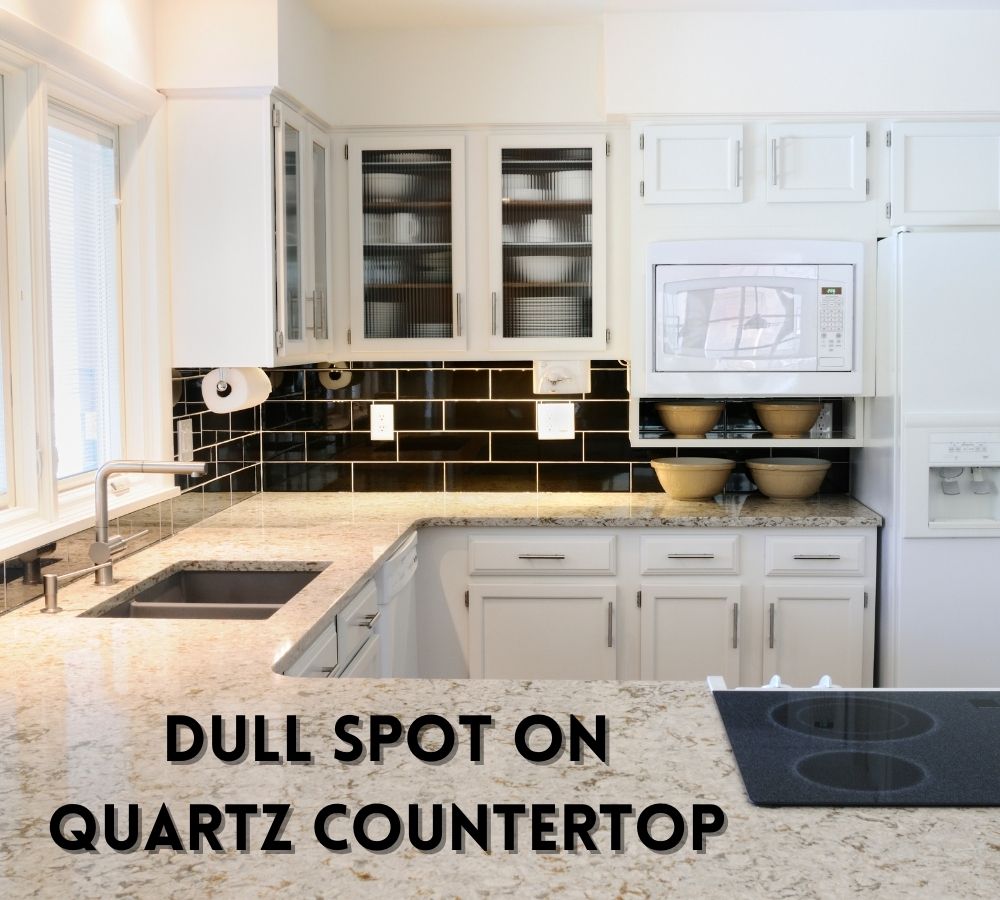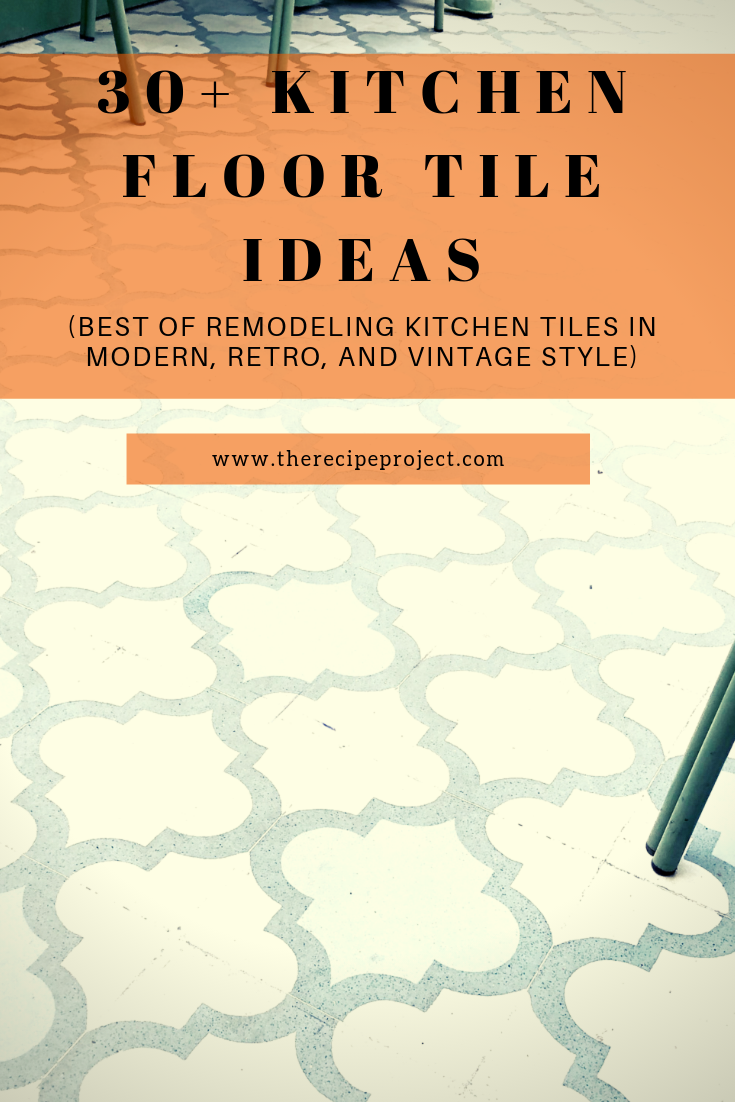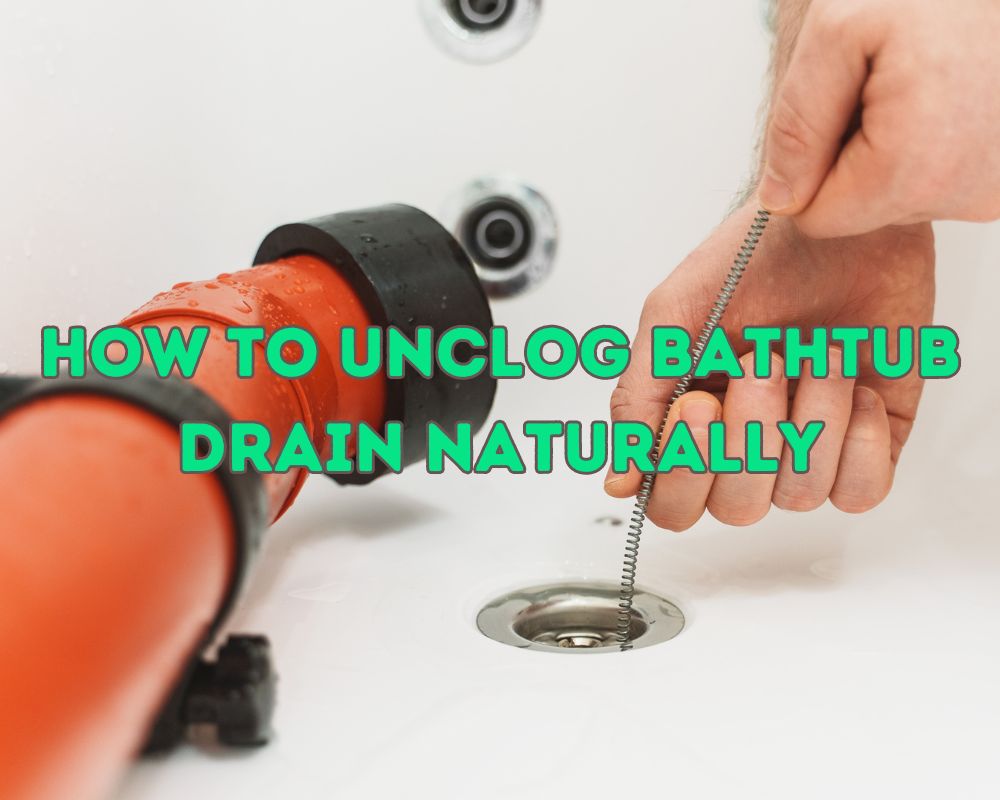Dull Spot on Quartz Countertop (How to Fix It)

Dull spot on quartz countertop. Do you need help with a dull spot on your quartz countertop? You don’t need to worry, as this guide helps you easily manage and eliminate it. From identifying the issue to finding an effective solution, you will learn how to clean surface stains from quartz countertops and restore their shining beauty.
Table of Contents
What is Quartz?

Quartz is a natural stone material that is commonly used to create countertops. It is composed of two elements, silicone, and oxygen, and is renowned for its quality and durability. That being said, quartz does have certain vulnerable areas that require care and maintenance to ensure its longevity.
Quartz countertops require regular cleaning to preserve their crystal-like appearance and to protect them from scratches and stains. Quartz can develop dull spots on the countertop’s surface without proper care and maintenance. However, these dull spots can easily be removed with adequate attention and elbow grease!
A process of cleaning, polishing, shining compounds, or professional repair services may be needed to remove the dull spots to restore the luster of your quartz countertop.
Identifying Dull Spot
Dull spots on quartz countertops are one of the most common complaints from homeowners. This can be caused by a burning hot pan or excessive pressure from repetitive cutting or scraping, but identifying the cause will make it easier to fix the problem. If a quartz countertop has a dull spot, it can be cleared up with some specialized cleaning products and simple techniques.
To begin, gently wash the quartz surface with warm water and dish soap, avoiding harsh chemicals that may further damage the quartz top. Once clean, inspect the area in question to determine what type of dull spot is present.
If there is a ring-like impression around the dull spot, then it may have been caused by something hot – such as a hot pan or plate – being placed directly on top of the quartz countertop. In this case, heat-resistant epoxy resin can fill in any cracks or depressions in the quartz surface to restore its smooth finish.
Alternatively, there is not a ring-like indentation around the dull spot. In that case, cutting or scraping over the same area multiple times could have caused scratches or etching into the surface of your quartz countertop. In this case, it’s important to use higher grit sandpaper (such as 1000-1500) and wet sanding techniques until you reach your desired finish and restore its smoothness.
Although stubborn stains and dents can be challenging to remove from quartz surfaces—it is possible when you use the proper tools and follow the proper procedures! Remember that chemical cleaners should always be avoided when trying to eliminate these problems on your quartz countertops – as they could potentially do more harm than good!
What Causes Dull Spots on Quartz Countertops

Dull spots on quartz countertops are a common issue and can arise from either improper cleaning methods or exposure to household chemicals. Quartz countertops are composed of natural minerals combined with polymers and pigments, creating a durable, low-maintenance surface. However, they require regular cleaning to stay looking their best.
When cleaning quartz countertops, it is important to use gentle products designed specifically for this purpose. Products labeled as ‘non-abrasive’ or ‘quartz-safe’ are generally acceptable for regular use.
Avoid harsh cleaners such as steel wool, abrasive cleaners, vinegar, or bleach, as these can all wear down the protective sealant layer of the quartz and cause damage resulting in dull spots appearing on the surface.
In addition, everyday household items like nail polish remover and oven cleaner contain chemicals that can discolor quartz if spilled onto the countertop surface. Immediately clean up any spills with warm soapy water to remove them before they have time to damage your stone surfaces permanently.
Ensure that you clean all chemical spills before beginning your normal cleaning routine so that any discoloration doesn’t become embedded into the sealant layer on the quartz surface during your daily brushing and wiping activities.
How Fix Dull Spots on Quartz Countertops
Quartz countertops are durable and beautiful, making them popular in many homes. Quartz is extremely hard, but it’s not immune to damage.
Minor scratches and chips can usually be repaired by the homeowner with just a few tools, but things can get more complicated when it comes to dull spots.
Suppose the quartz countertop is finished with an acrylic coating or sealer. In that case, the dull spots are often due to chalking caused by exposure to acidic substances that remove the protective layer.
Fortunately, this damage can often be fixed without replacing your entire quartz countertop.
To fix dull spots on quartz countertops, you’ll need a low-abrasive cleaner like SoftScrub or Bar Keepers Friend; microfiber cloths; liquid peroxide; protective eyewear; and rubber gloves for safety.
First, clean the surface with a non-abrasive cleaner to remove all dirt and debris from the area of concern.
Next, apply a few drops of liquid peroxide onto a cloth and gently rub the dull spot until it begins to shine again. Continue this until all areas appear glossy once again.
Finally, rinse with water and dry off with another microfiber cloth before adding food items or placing hot items directly on top of your newly polished quartz countertop!
Alternatives to Quartz Countertops
Quartz countertops are popular for kitchen, and bathroom remodels thanks to their durability and easy maintenance. However, even these high-end materials can sometimes suffer from dull spots caused by frequent use or chemical residue.
Fortunately, several alternatives to quartz offer similar levels of strength and stain resistance. One popular option is solid surface countertops such as Corian or Avonite, which share many of the same characteristics as quartz but may be available in a wider variety of colors.
Granite is another viable option due to its natural beauty and durability. It can also vary greatly depending on your chosen type; for instance, slabs of granite with detailed veining will cost more than plain varieties without much visual appeal.
Finally, butcher block counters provide a unique warmth and character to spaces—these are sure to add some personality wherever they’re installed!
Plus, they cost less than most other types of stone or engineered counters while still offering significant advantages like a low-maintenance finish and resistance to stains and scratches.
Ultimately, there are multiple options on the market when it comes to choosing an alternative countertop material; each brings something valuable to your home’s aesthetic, so feel free to explore all your choices!
Prevention Tips
To help you avoid dealing with a dull spot on your quartz countertop. Several prevention tips can help ensure your countertop retains its shine for many years.
First and foremost, it is important to use a cutting board or another protective material when preparing food. You must do this to avoid inadvertently scratching the surface of the quartz.
Additionally, any spills should be quickly wiped up as soon as they occur. Quartz can be damaged by acidic liquids like vinegar, lemon juice, or soda left on the surface for an extended period.
If a stain does occur, you should use mild detergent and a soft cloth to gently wipe away the stain, avoiding any abrasive scratching action. You should also avoid using harsh chemicals or scrubbing pads as these could ruin your countertop’s surface finish.
Additionally, it is beneficial to place coasters or towel mats beneath hot items like coffee pots or Nespresso makers, so they don’t damage the quartz upon contact.
Finally, all cleaning agents used on quartz countertops must be tested in an inconspicuous area before application over a visible area to prevent any abnormalities from appearing on the surface of the quartz.
With these prevention tips in mind, you should have little difficulty maintaining your quartz countertop’s pristine shine for many years!
How do you maintain the Shine of Quartz Countertops?

Quartz countertops are a durable and attractive option for many kitchens and bathrooms. However, it is important to properly care for them if you want them to retain their beautiful shine. To maintain the luster of quartz countertops, follow these guidelines:
1. Clean spills immediately; quartz is naturally resistant to stains, but allowing spills to sit on the surface can result in permanent discoloration or dulling.
2. Use only cleaners recommended for quartz surfaces; avoid harsh chemicals such as bleach and abrasive scrub pads on quartz surfaces, as these could damage or dull the finish.
3. Use a soft cloth or sponge with a mild dishwashing liquid when cleaning your counters; this will help keep dirt from building up and remove any residual dust that could cause scratches in the countertop’s finish.
4. Periodically apply cleaner specifically formulated for quartz; this will help remove dirt buildup more effectively and restore lost shine without causing any damage to the surface.
5. Avoid hard objects such as knives directly on your quartz countertop’s surface; cutting boards when preparing food is highly recommended to keep your counters looking great for years!
Professional Assistance

If you have noticed a dull spot on your quartz countertop, it’s recommended that you seek out professional assistance. Since quartz is a naturally hard and durable material, removing scratches and restoring the glossy finish requires expertise.
Before attempting any do-it-yourself treatments or solutions, contact a qualified stone refinisher or contractor specializing in countertop repair and maintenance.
A professional assessment of the condition of your quartz countertop can help determine if and how the dull spot can be improved. Depending on the severity of the damage, you may opt for services such as wet polishing using diamond pads for less severe damage or color enhancer solutions to improve an old surface or restore lost color.
In more serious cases where severe cracking or deep scratches have occurred, full restoration may be necessary, including grinding down material levels until it is smooth and replacing any cracked areas with epoxy resin.
All quartz countertops are not created equal when it comes to cleaning solutions – many standard cleaning products can actually damage your surface, leading to further issues in the future.
Investing in professional help has its benefits, too – these pros understand which products are best suited for your particular type of quartz and can provide insight into proper maintenance techniques that will help preserve your countertop in pristine condition for years to come!
Pros and Cons of Using Quartz Countertops
Quartz countertops are a popular choice for homeowners seeking stylish and durable surfaces. While they are attractive and hard-wearing, some potential issues exist with using quartz in your home. Understanding the pros and cons of using quartz countertops can help you decide if this material suits your project.
Pros:
- Quartz has a range of appealing colors and styles, making it easy to match other elements in the room.
- Quartz is resistant to staining, scratching, chipping, and cracking as long as it is properly sealed on installation and regularly maintained.
- Quartz has minimal porosity, so it is not easily damaged by water or other liquids seeping into it.
Cons:
- If a dull spot develops on quartz countertops, it can be difficult or impossible to repair or remove without special equipment or professional assistance.
- Quartz is one of the more expensive countertop materials available, so be sure you’re getting good value for your money when you purchase it.
- It’s normally necessary to use additional support brackets when installing quartz since they’re heavier than most other materials used in countertop applications.
What chemicals should be avoided with Quartz Countertops?
Quartz countertops have become a popular choice among many homeowners due to their beauty, durability, and low maintenance needs. Quartz is a naturally occurring mineral made up of silicon dioxide, so it can generally be safely cleaned with mild detergents and warm water.
Some quartz countertops may contain other materials, such as pigments or resins, so before you begin cleaning your quartz countertop, it is important to consult your manufacturer’s instructions to avoid potential damage.
When cleaning quartz countertops, avoid cleaners that contain bleach, acids (including vinegar), ammonia, or any abrasive scrubbers. Take special care with chemicals like chlorine and other bleaches that may damage the surface. Other chemicals, such as strong solvents and sealant removers, should also be avoided to protect the integrity of the quartz surface.
In cases where a dull spot does occur or your countertop has been damaged somehow, you can use a marble polishing compound specially formulated for use on quartz surfaces, followed by moderate buffing with a clean cloth to restore the luster of your quartz countertop.
What Chemicals are good to use on Quartz Countertops?
Quartz countertops are durable and provide an elegant look to kitchens and bathrooms. Keep them looking best; it is important to clean them regularly. Special care, however, must be taken when choosing cleaning chemicals for quartz surfaces, as some may contain components that could damage the quartz finish.
When cleaning quartz countertops, choosing products specifically designed for quartz surfaces or mild soaps or detergents that contain no acidic or abrasive elements is important. Abrasive cleaners, such as scouring powders or steel wool pads, can leave surface scratches and dull areas on the quartz surface.
In order to remove a dull spot on a quartz countertop, use a gentle cleanser specifically made for use on quartz counters. Removing any residual liquid from the countertop after applying the cleaner is important by wiping the surface dry with a soft cloth. This will help avoid water streaks and spots from setting in over time.
The most commonly recommended cleaners for maintaining quartz countertops are granite-specific cleaners that can be purchased at local stores such as Home Depot or Lowe’s. Cleaners should contain no harsh chemical agents such as ammonia, acetone, bleach, or acids (such as lemon), which can etch into and permanently damage surfaces of natural stones like marble and granite.
What can I use to clean my quartz countertop?

Quartz countertops are one of the most popular kitchen countertop surfaces on the market today, providing a beautiful and durable surface that is also easy to maintain. Regular cleaning and maintenance are key when it comes to keeping quartz in top condition.
To address spots on your quartz countertop, you’ll first want to identify what type of spot has occurred: is it a dull spot? Dull spots occur when dirt, oil, or grease settles into the porous nature of the quartz and can usually be removed with care using mild soap and warm water. You should avoid using any abrasive cleaners or pads, as this can damage the quartz countertop.
Once you have wiped down your quartz surface with a mild soap solution, let it air dry completely before reapplying your preferred sealant. Doing so will help minimize the likelihood of seeing similar moisture-related dull spots in the future.
Can Quartz Countertops be Buffed?
Quartz countertops are an attractive yet durable choice for your kitchen, bathroom, or other work surfaces. Over time, you may notice small imperfections occurring on the surface of your countertop, such as dull spots from daily wear and tear or streaks from cleaning products. If this happens, you may be wondering if quartz can be buffed to restore it to its former glory.
The good news is that quartz countertops can indeed be buffed. Depending on the severity of the blemish on your countertop, a simple buffing can often bring it back to life.
However, professional resurfacing may be necessary if the dull spot or streak is deep and will not come out after multiple attempts at buffing.
First, clean and dry the area thoroughly to buff a quartz countertop properly. Using a soft cloth with a mild polishing compound, such as a scouring powder or auto wax polish, is recommended for light rubbings.
You may also use an electric buffer with an extra soft bonnet pad lightly charged with a polisher formulated specifically for quartz stone surfaces – these products are available from most home improvement stores and online retailers.
Allow plenty of time (up to 10 minutes) for the product to work its magic before wiping off any residue left behind with a damp cloth and then drying until totally dry.
If multiple attempts at buffing fail to affect your quartz countertop, professional resurfacing using diamond grinding pads may be needed to bring it back to its original finish.
How to Restore Finish on Quartz Countertops?
Quartz countertops are attractive and durable additions to any kitchen or bathroom, but even highly durable natural quartz can be scratched or dulled with everyday use. Fortunately, quartz is a nonporous material that does not require sealing or polishing, so it is quite easy to repair and restore its natural finish.
The first step in restoring your quartz surfaces is cleaning the entire area with mild detergent and lukewarm water. You may have some stubborn stains that need to be dealt with individually. To remove the toughest soils, you can use baking soda or white vinegar and a soft brush and rag. When done correctly, this process should restore the original shine quickly.
The next step is to polish the dull material using a high-quality polish specifically designed for quartz countertops. There are several such products on the market; use one that doesn’t contain waxes or oils that could prevent proper adhesion over time. Using a damp cloth and working in circular motions, gently rub the polish over the affected area until it is evenly distributed over the entire surface.
When finished, take an old cotton T-shirt and buff out any remaining residue from your quartz surface until it shines like new again! Ensure not to use too much pressure when buffing, as this could further damage your countertop’s finish. If necessary, repeat this process until desired results are achieved. Always test small areas before attempting complete restoration on quartz countertops!
Conclusion
After carefully examining your quartz countertop, the dull spot is likely due to the accumulation of cleaners and other products. To remedy this problem:
- Use a soft cloth, sponge, and warm water to clean the area.
- For any additional buildup, use a mild pH-neutral cleaner with no abrasives.
- Never use ammonia or bleach cleaners on quartz, as they can damage the finish over time.
Quartz is also sensitive to abrasive compounds such as pumice powder, oven cleaner, and floor waxes that contain scouring agents. It is also important to regularly seal your countertops to preserve the finish and prevent any damage from occurring in the future. After cleaning the dull spot, apply a sealant designed for quartz surfaces to protect it from further damage. Read all manufacturer’s instructions before using any cleaning solutions or products to ensure you follow their guidelines accurately.
Frequently Asked Questions
To remove a dull spot from your quartz countertop, you can use a mild abrasive cleaner, such as a powdered cleaner or a solution of baking soda and water. Apply the cleaner to the dull spot and scrub gently with a soft cloth. Rinse thoroughly and dry the area with a clean cloth.
If the dull spot still doesn’t come off, you may need to sand the area lightly with a sanding pad. This should only be done if the area is small and you are sure that the quartz countertop is sealed. Afterward, use a mild abrasive cleaner to finish cleaning the area.
Yes, you can help to prevent dull spots from forming on your quartz countertop by wiping up spills as soon as they occur and cleaning the surface regularly with a damp cloth and mild soap. Additionally, use a cutting board when preparing food on your countertop to avoid scratches and dull spots.


